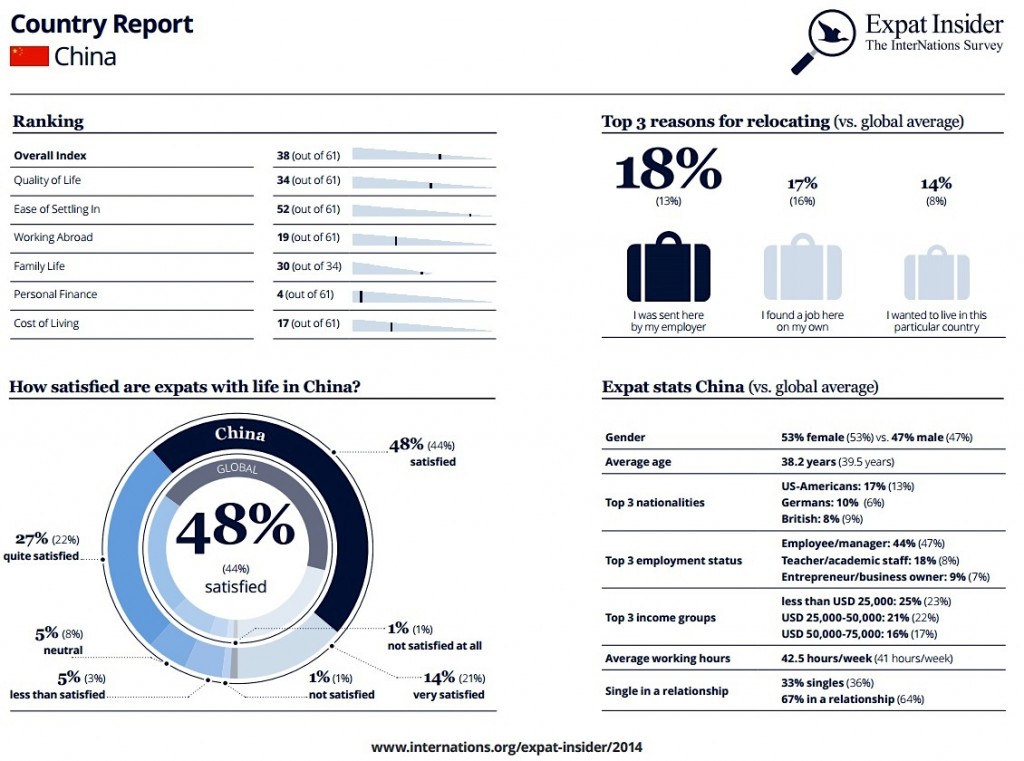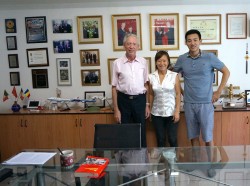This interesting survey was published by Internations. For the original article:
http://www.internations.org/expat-insider/2014/china
Every survey has a different angle and one can always criticize the results. It also very much depends on how the survey is carried out and who were the typical contributors. Here they are mostly young to middle-level professionals who have a rather steady job and are “legal” (see the graphics for the details). Anyway the results are interesting while it all finally depends on the individual way of living, taste and goals. For quite a number of expats, life overall is rather good in Beijing while costs of housing and schooling are a serious concern, along the heavy pollution and more stringent visa rules. See here the results:
China is a great place to work, but can it feel like home? Results suggest that it is neither easy to settle in nor great for expat families.
An economic hub, people go to China for business and work, as well as to benefit from the country’s comparatively low cost of living. However, although China ranks 4th in Personal Finance and 19th of 61 in the Working Abroad Index, it faces sharp criticism in regards to the general quality of life.
Only 14% of expats in China are completely satisfied with their life abroad, which lags behind the global average of 21%. Moreover, survey participants also indicate a marked dissatisfaction with the country’s medical facilities; only 32% agree the system is good compared to the global average of 53%.
Expat Statistics China infographic

Small Cost in Big China
The low living costs in China makes it a beacon of value in an expensive world. While only one in three (35%) expats the world over find their local cost of living to be either good or very good, China excels with nearly half of the respondents living there agreeing to the same (48%).
The comparatively low cost of living is complemented by a greater disposable income, as 59% of expats in China agree that their income easily covers everyday expenditures, in contrast to the worldwide average of 45%.
Companies seem to be trying their best to attract expats to China, too. Four of five respondents (83%) say they received help from their employer with attaining a work visa and two in five (42%) say they were provided housing by their companies. This overshadows the global averages of 65% and 29% respectively. It also helps explain why the most frequently cited reason for expatriation to China is work; 18% say they were sent by an employer and 17% found work there themselves.
Finding Ying and Yang
China plummets down the overall country index when one takes the Ease of Settling In into account, however, where it ranks 52nd out of 61. Famed for the affability of its people, the survey results highlight how expats experience a chasm between politeness and formulating friendships. Although three-quarters of respondents (76%) agree that they work with very few expats, they are less likely to have friends who are local residents. Rather, 45% say they usually meet people at expat events, whereas this figure is just 36% worldwide
However, this could ultimately be due to the culture gap between expats and the local culture. Although 43% of participants profess to the ability of being able to speak Mandarin, just one in five (23%) agree that it is easy to get used to the local culture compared to the global average of two in five (41%). As such, only one in ten (12%) expats in China feel completely at home.
Homeschooling Anyone?
Further dragging China down is its poor display on the Family Life Index, where it comes just 4th from the bottom (30th out of 34). However, this is mainly due to its education system, for the country remains on par with the global averages for most aspects of childcare and general family life.
Expats in China are, with 16%, half as likely to agree that education choices were numerous and readily available compared to the worldwide average of 32%. Thus, respondents in China are more likely to send their children to an international school than their compatriots elsewhere (45% against the global 35%) and as a result find education to be very expensive.
However, according to the survey results, one of the grimmest aspects of life in China is the atmosphere it presents for children. One fourth of participants (25%) are not happy in regard to their children’s health and safety there. On a global scale, only 11% feel this way.
2014: China at the crossroads: the latest Newsletter
I have started a regular newsletter, in principle monthly, focusing on China’s economy, environment, business and any topic that merits a closer look.
The first edition looked into the Chinese real estate market, to give an overall view on what real estate companies, news media and economists are talking about. Certainly a hot topic, as hot as the Beijing weather. If you did not receive it, see here:
https://blog.strategy4china.com/?p=5561
Snapshot China – Newsletter No. 2 looks into the many challenges China is facing in 2014 and how the government under the leadership of President Xi Jinping is expected to cope with it all.
Working with China since late 1980 I have lived through many ups and downs. There were times we thought the future looked bleak, the least to say. Three decades later, the country has witnessed a unique progress, transforming a grim Stalinist-looking country into a world power.
Today the country is at the crossroads facing the most serious challenges since its opening up in the late seventies. Its leaders confirm our worries by admitting the situation is indeed critical.
It is easy to be a pessimist today.
My intent is to give a quick overview on the complexities when trying to understand China’s challenges. For some foreign observers, “China should do this or that and all will be well.”
If it were that simple.
Overall, I admit to be worried but I still remain more on the side of the optimists.
You can download the complete report here: China2014.pdf
Prof. Gilbert Van Kerckhove
Author of “Toxic Capitalism”
http://prodygia.com/experts/gilbert-vankerckhove/profile
Twitter: @bjprc
Interview Bloomberg News (TV) in my office
Another Bloomberg interview today 5 August, same place (our meeting room), same lady – Christine Hah, just another cameraman as my friend Dieter left for Belgium.

This time, a near two hour discussion, I can say mostly covering the newsletters I am currently working on: the e-vehicle market in China, the challenges China is facing in 2014 plus “restauration” of the Gulou area. And about the complicated USA-China relations.
Gilbert on am774 Beijing Radio: Brazil, Belgium and football
This time, “Mighty Bruce” wanted to know more about my Brazilian past. See here:
http://am774.rbc.cn/netfm/english_service/ourteam/bruce/201407/t20140714_711714.htm
You can listen here (I won’t!):
The interview has really forced me to dig into my museum of pictures. The picture with my Ford Galaxie also shows my late wife Danielle, mother of my daughter Marianne who was born in Recife. See here others not used, showing how Brasilia, the capital of Brasilia, looked like in late 1979.
The pictures were taken in the center of the new capital and on the main boulevard, with the ministries lined up. It looks empty, quiet. Little vegetation. I cannot imagine how it looks like now! The pictures are scans from diapositives, with my new powerful scanner. Still a lot to learn how to improve the scanning.
The last seminar of the season: Yeshiva MBA from NYC
It has been a busy season for seminars, mostly EMBA and MBA.
To close the first half of the year, a new group: Yeshiva University from New York City.
The Syms Executive MBA program curriculum was developed to challenge students to hone their business expertise in a way that prepares them to achieve their current and future professional goals. The general management Executive MBA is designed to help to learn how core analytical skills and management tools fit together, enabling to become more effective in the current career.
Students come from wide-ranging professional backgrounds in finance, marketing, nonprofit, sales and technology
During their program in China (Shanghai & Beijing), the 18 EMBAs/MBAs visited leading companies on the Chinese market to learn and understand the energy, complexity and dynamism of the Chinese economy, along with the challenges and opportunities for foreign business in China. The EMBAs visited manufacturing, supply-chain and marketing operations, industrial facilities.
The leading faculty members of the International Residency: Andrew Geller, Visiting Professor of Management, Sy Syms School of Business at Yeshiva University and Aviad Peer, Associate Professor; Management and Global Business.
My 90 minutes talk: “China 2014: Policy risks, opportunities and challenges & The Chinese decision making process”.



